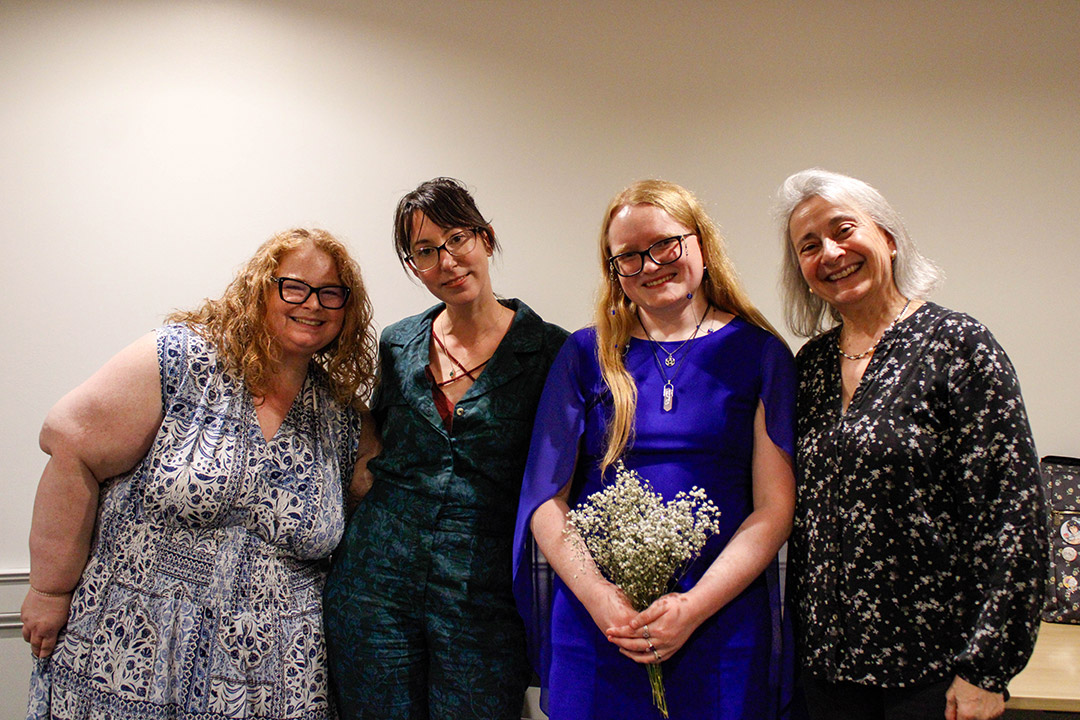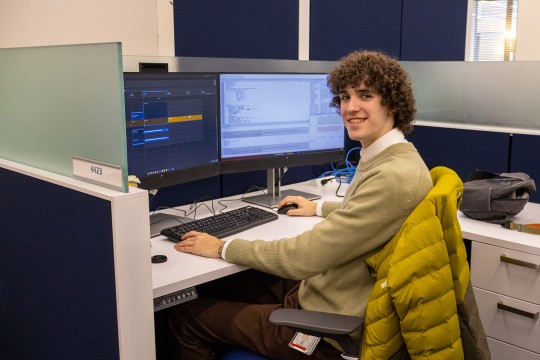Women’s, gender, and sexuality studies program honors first graduating class
The new bachelor’s degree program celebrates two graduates
Hailey Fowler
From left, Tammara Wickson, Danielle Pafunda, Molly Kohli, and Silvia Benso pose for a photo after Kohli presented her senior capstone project, Hues of Oppression. The creative world building project channels lessons and histories she studied throughout her time at RIT.
The first class of graduates from RIT’s women’s, gender, and sexuality studies (WGSS) program will be celebrated during commencement this month. Molly Kohli, from Rome, N.Y., and Gaby Licona, from Miami, will be the first of many future alums from the program.
The WGSS program has long existed at RIT, and, in 2023, the bachelor’s degree program was approved and offered for current students. Starting in the fall of 2024, enrollment will be available to incoming first-year students.
Silvia Benso, who has served as the WGSS program director for six years, expresses her excitement about celebrating the first graduates and increasing the program’s offerings through this added degree pathway.
“The WGSS degree is very flexible. As a primary major, it opens the way to innumerable careers where people skills and a passion for gender justice are required—from diversity, equity, and inclusion-focused jobs to counselors and advisors in various educational, but also industry contexts to advocacy and activism in various fields,” said Benso. “As a double major, one can become virtually anything they wish—an engineer, a game designer, a health practitioner, an entrepreneur, a political scientist, and more— all with a well-rounded, needed sensitivity to increase gender equity and justice in one’s field of professional activities.”
After taking courses in the program for four years, Kohli had completed much of the work required of the new bachelor’s degree program prior to its existence. This experience allowed her to change her major to WGSS once the degree was approved.
Kohli says that combining her WGSS education with what she learned through her minor in anthropology and sociology helped her gain a greater understanding of people and how they interact with and react to one another.
“When considering people’s different cultures and demographics, you can more easily figure out why they react in certain ways, and what we might do on a cultural and societal level to mitigate negative reactions toward one another,” said Kohli. “A big part of anthropology is making sure people’s voices are heard and that we’re uplifting diverse voices. Using that mentality when approaching women’s, gender, and sexuality studies is incredibly important.”
After graduation, Kohli aspires to work in a library in a role focused on community building with plans to pursue a master’s degree in library sciences in the future.
Licona, who is a double-major in WGSS and communication, says that she has always been a big advocate for social justice and feminism. She earned a minor in women’s and gender studies prior to the new degree offering, and she is grateful for the opportunity to take on the additional major during her last year at RIT.
As she makes plans and goals for her post-university career, Licona shares that her dream job is to work in social media marketing for a feminist or women-led organization that shares her same values.
“Being the president of the Her Campus chapter here RIT, I’ve had the chance to write articles related to college women and I've seen what it's like to work in a group with college students just looking for a safe space,” said Licona. “So that experience really pushes me to want to work for a women's magazine or women's organization that provides resources and educational sources for other individuals on women, feminism, and advocacy targeting towards social justice.”
Licona credited her success in the program to her close friend Mackenzie Vanacore ’22 (English), who introduced her to WGSS, as well as her work with Advance RIT and senior staff specialist Silvia Caraballo. Both Vanacore and Caraballo inspired her and helped her to pursue her goals.
Looking ahead to the next academic year, Benso anticipates that interest in the new degree program will continue to grow.
“Molly and Gaby are both emblematic of the various options a WGSS degree offers. They both understand the value of a WGSS education for the present and the future. I like to think of them as ‘visionary’ students, students who, in a truly RIT spirit, have an innovative vision of a better world to come and are willing to take the initiative to make it happen,” said Benso. “I look forward to welcoming more students like them to the program.”
For more information about how to enroll in the women’s, gender, and sexuality studies bachelor’s program, go to the department website or email Silvia Benso at silvia.benso@rit.edu.




